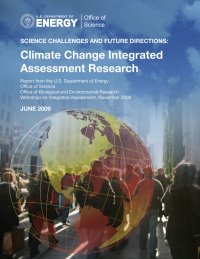Atmospher Sci & Global Chg
Research Highlights
August 2009
PNNL Scientists Help Inform Nation's Climate Change Research Agenda
Top six research challenges in integrated assessment and a path forward to address them
Results: Experts at Pacific Northwest National Laboratory played significant roles in a U.S. Department of Energy report that ultimately will help DOE shape the Nation's future research agenda in climate change integrated assessment.
To create the report, Science Challenges and Future Directions: Climate Change Integrated Assessment Research, DOE's Office of Biological and Environmental Research convened scientific experts at a workshop in November 2008. The workshop defined the scientific challenges and opportunities in the worldwide integrated assessment community and a path forward to address them.
Integrated assessment to address climate change combines information from multiple disciplines such as climate science, carbon cycle, atmospheric chemistry, economics, energy technology, land use, hydrology, and agronomy, and spans a broad range of temporal and spatial scales, to yield climate change insights that would otherwise be unavailable.
The report identified the following six main research challenges to be addressed by integrated assessment:
- Mitigation, transformational science and technology, and complex interactions
- Impacts, adaptation, and vulnerability
- Spatial and temporal resolution
- Risk, uncertainty, and diagnostic methods
- Interoperable and accessible modeling frameworks and collaborations
- Data development and accessibility.
The workshop chair was Dr. Anthony Janetos, Director of the Joint Global Change Research Institute, a partnership between PNNL and the University of Maryland. PNNL scientists who were also involved in all phases of the workshop and report were Drs. Leon Clarke, Liz Malone, Jae Edmonds, and Ruby Leung.
Why it matters: Climate change is real, and its effects are more immediate and profound than previously anticipated. Today's decisions will matter greatly to the future course of the environment and human well being. By identifying and ultimately addressing the challenges outlined in this report, the integrated assessment research community can play an increasingly important role in understanding the scientific foundations of those decisions.
Method: This report and the November workshop represent the synthesis of supporting, focused workshops; meetings; white papers; and other venues for critical thinking that were sponsored over the past two years by DOE's Office of Biological and Environmental Research, Integrated Assessment Research Program.
What's next: This work is part of PNNL's quest to model the complex interactions of human and natural Earth systems, to predict climate change and its impacts, and to understand mitigation and adaptation options. The report's findings will provide new insights for decision makers who must meet energy demands, manage natural resources, and set policy.
Acknowledgments: The workshop report was supported by the DOE's Office of Biological and Environmental Research, as part of the U.S. Global Change Research Program.
Research team: In addition to PNNL staff, the report was authored by 20 people from Federal agencies, universities, national laboratories, and other research institutions.
Reference: U.S. Department of Energy. 2009. "Science Challenges and Future Directions: Climate Change Integrated Assessment Research." PNNL-18417, U.S. DOE, Office of Science, Office of Biological and Environmental Research, Washington, D.C.

